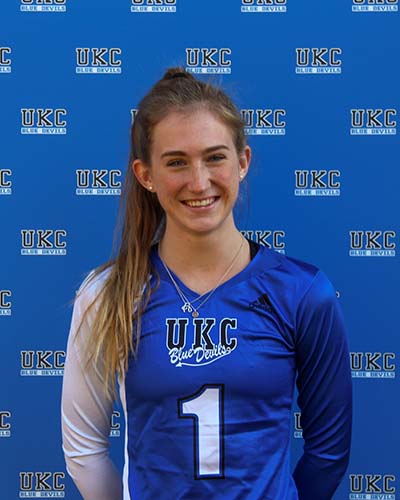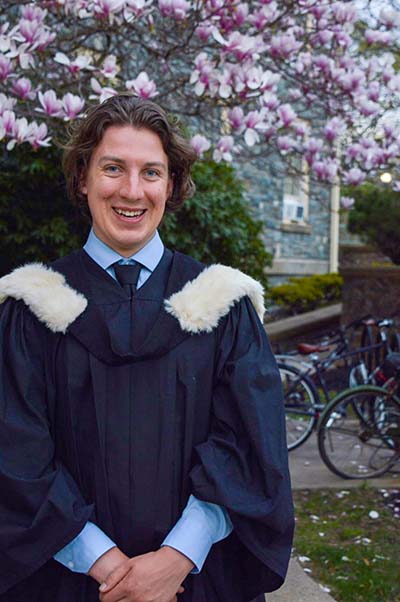With graduation 2021 almost here, we’re highlighting a few of the students finishing their time at King’s. We applaud the hard work and dedication shown by the entire Class of 2021 and we wish them great success and fulfillment!
Abby Hourigan, Bachelor of Science, major in Psychology with a minor in History of Science and Technology
Abby Hourigan traces her interest in science back to high school, citing “a really great Grade 9 science teacher” as an early influence.
“I started loving science that year,” says Hourigan, who will soon graduate from King’s with a Bachelor of Science degree, with a major in Psychology and a minor in History of Science and Technology (HOST).

Abby Hourigan
During the Foundation Year Program (FYP), her interest in science deepened. Hourigan, who came to King’s from Burlington, Ont., found that the texts she enjoyed the most were science-related, and that prompted her to explore the courses offered by HOST. Liking what she saw, she ultimately minored in the program.
Hourigan’s highlights from her HOST experience include the program’s “passionate professors and small class sizes,” and “so many fascinating courses that give you such a good understanding of how the history of science has evolved.”
Hourigan especially appreciated the holistic approach that HOST takes, saying that being a student in the program gives you the opportunity to learn about science from a liberal arts standpoint. She particularly enjoyed her classes with Dr. Stephen Snobelen, who helped found the Newton Project, a University of Oxford-based project devoted to Newton’s lesser-known manuscripts.
“Dr. Snobelen is a Newton scholar, so he teaches you about Newton’s scientific work but also about his philosophical and religious views. I took a lot of his classes. They were amazing.”
Outside of class, Hourigan has been a member of the King’s women’s volleyball team, and a recipient of the Debra Deane Little and Robert Little Academic Scholarship for Varsity Athletes. Hourigan says her involvement in sports has benefitted her academic pursuits.
“Volleyball was a great way to take a break from schoolwork, where I would go and practice for a couple of hours, vent some pressure. It was wonderful socially, too. I’ve made a lot of great friends thanks to my involvement in sports at King’s.”
Michael Kishchuk, Bachelor of Science, combined honours in Earth Sciences and History of Science and Technology
Michael Kishchuk’s interest in science stems from a lifelong natural curiosity. From a young age growing up in the Yukon, he always wanted to know “how the world works.” And while his high school years involved studying lots of math, physics and chemistry, he was also curious about other subjects.
“I took English in high school, of course, but there wasn’t much in terms of humanities, so when I learned of FYP Science, where you could study the humanities while also doing a science degree, that was what pulled me toward King’s.”

Michael Kishchuk
Kishchuk learned about HOST “kind of late.” At the end of his second year, he took a spring class taught by Dr. Gillian Gass on the history of marine science which he says, “blew my mind,” and he began to explore the program’s other offerings. Now in the spring of 2021, Kishchuk is about to graduate with a combined honours in Earth Sciences and History of Science and Technology.
“Dr. Gass has such a rich understanding of both science and history, so she’s really able to show you how the arts can be so complimentary to the understanding of the science. It was a true interdisciplinary experience.”
Kishchuk also says the writing skills he learned at King’s will greatly enhance his scientific work.
“In science courses, there’s not a lot of writing to do, so when it comes to writing a thesis, some science students can find themselves in trouble. But at King’s, I was writing term papers all along the way, so for me, writing the thesis was a lot less intimidating because of all the papers I’d been writing.”
In addition to Dr. Gass, Kishchuk cites Dr. Gordon McOuat’s Philosophy of Science course, in particular the reading of The Structure of Scientific Revolutions by Thomas Kuhn, a classic text on the history of science.
“Kuhn understood science from the inside, then stepped back and looked at the philosophy of it. I felt a connection because he spoke to what it was like to go through a science education, with insights on how textbooks work, on what undergraduate science is teaching students. Looking back, that was a pivotal book for me.”
Hannah Peres, Bachelor of Arts, combined honours in Economics and History of Science and Technology
Hannah Peres originally planned to do a science degree at Dalhousie, but a tour of King’s and learning about the Foundation Year Program (FYP) prompted her to change her mind. Even then, Peres came to King’s thinking she would complete FYP and then go back to her hometown of Ottawa to do a microbiology degree. Her year in FYP made her want to stay.
Peres says that as a FYP student she liked how the HOST professors would go past the actual mechanics of science and explore its social and historical elements—elements which, she says, “I sometimes found more interesting than the science itself!”
Four years later, Peres is about to graduate with a BA in Economics and the History of Science and Technology.
Ultimately the blend of science and history offered at King’s was perfect for Peres. An avid reader since childhood, she developed an early interest in topics like historical medicine, especially as it was practiced during the Elizabethan era, and—going back even further—the ways in which our ancestors of the 14th century dealt with a disaster like the Black Plague. So Peres found herself very much at home in HOST courses like Origins of Modern Medicine.
HOST Director Dr. Gordon McOuat says that Peres “wrote a wonderful thesis,” which featured the two chess matches of 1996 and 1997 between Gary Kasparov, world champion at the time, and the IBM supercomputer, Deep Blue.
“I used the two chess matches as the focal point of my thesis,” says Peres. “I used it as a kind of sample plot in which I examined larger AI trends.”
But does she herself play chess?
“A bit. I used to play with my father when I was younger. But I would say that my work on my thesis has brought back an interest, for sure.”
Hannah plans on working this year and applying to some masters programs, stating she’s very interested in health policy and management, as well as epidemiology. At the time of this writing, Hannah was off in the wilderness planting trees, regrettably lacking enough wifi signal to be able to share a photo.
Join us on May 27 to honour and congratulate the Class of 2021! The celebration will be shared on Facebook and YouTube May 27 starting at 3 p.m. AT. Learn more.

